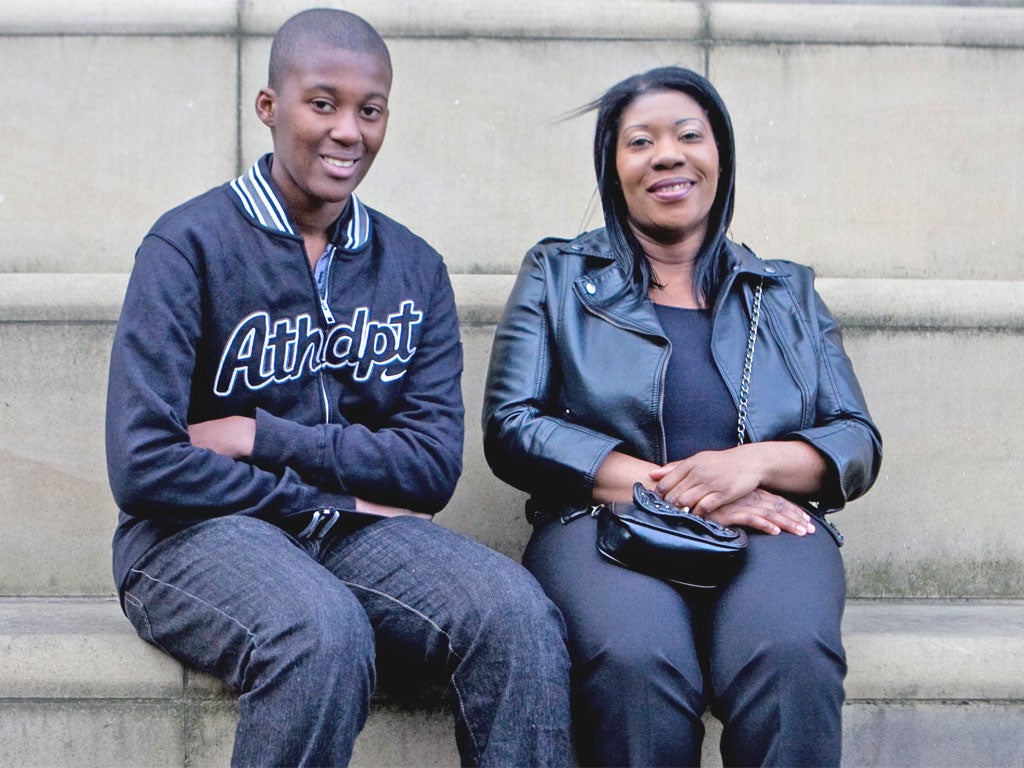Independent Appeal: The boy who was saved from the bullies
With the number of young runaways growing, projects are needed to help children like Mark

Settling into his new secondary school proved more than normally challenging for Mark. Tall for his age, friendly and fascinated by gadgets, the 13-year-old with the ready smile has communication difficulties, making him vulnerable and a target for bullying.
"There were a lot of kids calling me names in their own languages. I was sad that no one was listening to me," he recalls, describing his troubled first year at the large inner-city academy.
While the other pupils would want to talk about football and girls he was more interested in theatre and web design. He grew too scared to go into the dining room at lunchtime, stopped eating and began losing weight. Yet some boys seemed determined to take advantage of Mark's trusting demeanour, explains his mother, Marlene.
Last summer he began leaving school at 3pm, travelling all over the city and not returning to his home in Manchester until late in the evening.
On one occasion he was abandoned by his "friends" several miles away in neighbouring Salford after being lured there on the false promise of going to the cinema. He was frightened and did not know how to get home.
"I felt I could be away from the problem. I felt I could go to a different area and leave the problem behind. I knew I shouldn't be there," he admits now.
Another time Mark, who cannot swim, was spotted by a family friend close to a polluted canal where a group of boys had taken him.
Although the most common age for running away is between 14 and 15, profound changes to modern childhood mean the "pull" factors which convince youngsters to go missing have become stronger at an earlier age.
Case workers at the Children's Society – whose campaign to help runaways is one of the three causes being supported in this year's Independent Christmas Appeal – have helped Mark get back on track in recent months. But according to them the number of very young runaways appears to be growing. At the charity's project in a converted mill in Ancoats they say it is not unheard of for children aged just eight or nine to be found by police wandering in the city centre late at night.
Elise Noblet, a senior project worker, says she has noticed a change in the past six months with an increasing number of young boys needing help. Younger runaways are particularly vulnerable to predatory adults or older children.
"They want a bit of adventure. They want to go out at night and they don't seem to realise going into the city centre late at night is not an extension of their back garden. There is no awareness of safety issues. They get on their bikes and ride all over the city," says Ms Noblet.
A product of a loving home with a strong and articulate mother, Mark defies the misconceived stereotype of the troubled youngster on the cusp of adulthood setting off on a train for London with a rucksack full of possessions.
A recent survey for the Children's Society has gone some way towards confirming the observations on the ground after finding that 36 per cent of young people had run away for the first time before the age of 13 – an increase of 6 per cent compared to 2005.
Now thanks to the help of the charity's Missing From Home service, one of nine such projects nationwide, Mark is making excellent progress.
He has stopped running away and is channelling his energy into more constructive activities. He describes how he recently approached the manager of his local Apple store seeking work experience and is involved in community projects. His ambition is to have a "good job and a good lifestyle".
Marlene, 47, is delighted with what her youngest son has achieved. "I didn't want to lose him to the streets," she says. "It is wonderful to see him smiling again all the time now. There was a sadness in his eyes but now the light has come back. The funny person, the cheerful person is back," she adds.
Appeal partners: Who we're supporting
Save the Children
Save the Children works in 120 countries, including the UK. They save children's lives, fight for their rights and help them fulfil their potential. Save the Children's vital work reaches more than 8 million children each year - keeping them alive, getting them into school and protecting them from harm. www.savethechildren.org.uk
The Children's Society
The Children's Society provides vital support to vulnerable children and young people in England, including those who have run away from home. Many have experienced neglect, isolation or abuse, and all they want is a safe and happy home. Their project staff provide essential support to desperate children who have no-one else to turn to.
Rainbow Trust Children's Charity
Rainbow Trust Children's Charity provides emotional and practical support for families who have a child with a life threatening or terminal illness. For families living with a child who is going to die, Rainbow Trust is the support they wished they never had to turn to, but struggle to cope without.
At The Independent we believe that these organisations can make a big difference to changing many children's lives.
CLICK HERE TO DONATE NOW.
Subscribe to Independent Premium to bookmark this article
Want to bookmark your favourite articles and stories to read or reference later? Start your Independent Premium subscription today.

Join our commenting forum
Join thought-provoking conversations, follow other Independent readers and see their replies